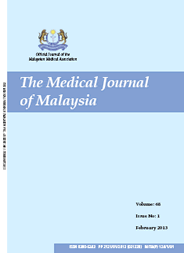MJM, Vol 70 Supplement 1 September 2015
Iodine nutritional status amongst school children
after 5-Years of universal salt iodisation in Sarawak
Sarawak State Health Department, Kuching, Sarawak
ABSTRACT
Introduction: Iodine deficiency is a public health problem worldwide. Deficiency in iodine causes neurological disorders and physical development and children are susceptible group. Iodine deficiency disorders (IDD) is prevalent in Sarawak. Many intervention programmes have been conducted to eliminate the IDD including universal salt iodisation (USI) programme. The objective of the study is to determine the iodine nutritional status amongst school-aged children in Sarawak after 5-years of USI programme.
Methods: Sarawak State IDD Survey Database from 2014 was used and findings from National IDD Survey from 2008, which has been published, as a comparison. Urinary iodine concentration (UIC) was used as impact indicator. Cut-off point for classifying iodine nutrition into different degrees of public health significance and criteria for monitoring progress towards eliminating IDD as a public health problem were based on WHO/ICCIDD/UNICEF (2001).
Results: The median UIC in 2014 was sustained optimally at 114.9 µg/L. Overall, the percentages of children with iodine deficiency status significantly lower in 2014 (41.2%) compared to 2008 (49.3%). The median UIC in rural significantly improved from 91.9 µg/L (mild iodine deficiency) in 2008 to 113.6 µg/L (no iodine deficiency) in 2014. The Bumiputera’s median UIC also improved from 95 µg/L in 2008 to 123 µg/L in 2014. The prevalence of iodine deficiency was still observed in Miri, Kapit and Limbang divisions. No differences noted in median UIC between children from urban and rural schools in 2014.
Discussion: After 5-years of USI implementation, the nutritional iodine status of the school-aged children in the rural areas of Sarawak has improved. Strengthening monitoring and evaluation of the programme should be conducted regularly and public health education on the important of using iodised salt should be continuously carried out.
Keyword: iodine deficiency disorders, iodine nutritional status, universal salt iodisation, Sarawak
